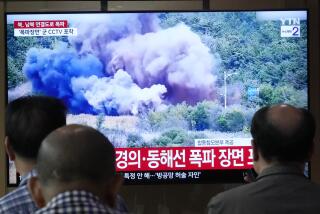S. Korean Strikes in Crucial Phase, Analysts Say
TOKYO — With organized labor and the government in Seoul moving toward a showdown over a controversial new labor law, analysts say the next few days will be crucial in determining whether strikes threatening South Korea’s economy will spread or fade away.
South Korean President Kim Young Sam today bluntly rejected strikers’ demands to scrap the law, which gives employers new powers to lay off workers. The law is vital to boosting the nation’s strength in an era of global competition, he said at a news conference.
“It is not an evil law,” Kim said. “If business fails, where will the workers be? You must let businesses live. . . . Those with whom the workers and firms should be competing are their foreign counterparts.”
Kim’s tough stance fit with moves signaled Monday by authorities and business leaders to take an aggressive strategy to suppress the labor actions, which come at a time when South Korea’s economic growth is slowing and exports are weakening. The strikes began Dec. 26, and at their peak about 350,000 workers walked off their jobs.
Prosecutors issued summonses for questioning--a preliminary to possible arrest--to labor leaders across the country Monday and said they would probably seek to arrest at least 20 union officials.
A central question is whether public sentiment--which has leaned toward the unions--will still support labor. Many analysts predict that such support will be limited now, when economic gloom prevails and wages already are relatively high for the best-organized workers.
Kim also called on North Korea to join proposed four-party peace talks that would include the United States and China. In such talks, South Korea and North Korea “would play the major roles,” he said.
The Communist government in Pyongyang has long expressed a preference for direct talks with the United States, but it has recently said it was willing to consider the four-party structure. The 1950-53 Korean War ended with an armistice, but a formal peace agreement has never been signed.
Kim also tempered his tough stance toward the strikers with a promise that his government would “do its level best to assist in ensuring employment security.” That was an apparent reference to a vague plan announced Monday to enact legislation that would place clearer limits on employers’ new powers to fire workers--a promise some saw as a limited concession aimed at defusing the strikes.
But Kim’s gesture was immediately rejected by Kwon Young Gil, president of the Korean Confederation of Trade Unions (KCTU). “We have no choice but to intensify our strikes,” Kwon said.
*
The job actions are directed by two umbrella union groups: Kwon’s outlawed KCTU, with 500,000 members; and the more moderate Federation of Korean Trade Unions (FKTU), with 1.2 million members. While the confederation is technically illegal, it has been allowed to function openly. An estimated 100,000 to 150,000 workers struck Monday, Korean media reported.
Cho Dong Sung, a Seoul National University economics professor, said he believes public sentiment opposes major strikes that could damage South Korea’s economy. This is because most South Koreans sympathize with employees of small- and medium-sized businesses, which are facing hard times, more than they do with workers at major firms that are the center of export production and union activity, he said.
“The shutdown of factories of major companies literally means shutting down the factories of thousands of parts suppliers,” Cho said. “Small- to medium-sized companies are in a dire situation.”
While South Korea’s economy grew an estimated 6.8% in 1996, that is down from 9% in 1995; growth is expected to be less this year if labor strife continues.
Ironically, the law that provoked labor’s fury was expected to be a major step toward granting unions more rights in line with international standards. The government has linked passage of the law to its admission Jan. 1 as a member of the Organization for Economic Cooperation and Development, a 29-member grouping of the world’s most industrialized nations.
As recently as a month ago, most discussion of the law focused on expectations that it would legalize the KCTU and allow creation of industry-wide trade unions, in contrast to the system of company unions more typical of South Korea and Japan--a system that tends to weaken labor’s bargaining power. The law took these steps but unexpectedly postponed them until 2000.
The law also has angered labor by making it easier for companies to lay off workers. The new law “conforms to international trends” and thus there is no public consensus in support of unions, said Lee Han Koo, director of the Daewoo Economic Research Center.
The union groups said that unless Kim withdraws his support for the labor law, 210 local unions with 240,000 workers affiliated with the KCTU will strike Wednesday and unions associated with the other group will walk out next week.
Chi Jung Nam of The Times’ Seoul Bureau contributed to this report.
More to Read
Sign up for Essential California
The most important California stories and recommendations in your inbox every morning.
You may occasionally receive promotional content from the Los Angeles Times.










